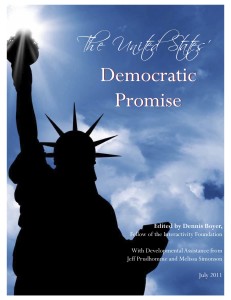 IF’s Democratic Promise guidebook has been discussed a number of times since its initial publication. Interest in the subject seems to somewhat track the election cycle and concerns about election process and practice features that are seen as shaping election results: Electoral College, gerrymandering, voter suppression, etc. This guidebook has, perhaps, generated more disparate reactions—both pro and con—than any of our other guidebooks.
IF’s Democratic Promise guidebook has been discussed a number of times since its initial publication. Interest in the subject seems to somewhat track the election cycle and concerns about election process and practice features that are seen as shaping election results: Electoral College, gerrymandering, voter suppression, etc. This guidebook has, perhaps, generated more disparate reactions—both pro and con—than any of our other guidebooks.
The generally low level of civics education in our society leaves some gaps that can make discussion of these and related topics difficult. At times, even those with college educations struggle with the particulars of how elections are governed. At the same time, such discussions usually find a great deal of receptiveness to the general idea of improving public participatory methods, both in elections and in other forms of citizen engagement.
Prior to Labor Day 2018 I was asked to assist in developing a series of dinner discussions on “democratic renewal” in my area of southwest Wisconsin. The plan was to hold six different discussions during October in six different homes around the region. Each site was to leave the timing and logistics to the host organizer. The participants were encouraged to review the Democratic Promise guidebook prior to the dinner meetings. The guidebook was meant to serve as a prompt and a “food for thought” item, not as strict discussion agenda material. Each host committed to assembling a “diverse” group in terms of partisan composition, gender, and ages.
Each discussion was charged with the initial task of a “lightning round” on participant understandings of what democracy means and how they felt about the governance task of revisiting and possibly modifying fundamental aspects of our representative democracy system. From there, the groups were encouraged to further explore possible changes to the current system(s).
Two of the six groups were unable to get past the first task. These groups had participants who thought the approach was flawed and felt it was too tilted toward an assumption that the US Constitution was in need of major revision. A number of participants felt the guidebook itself caused this type of assumption (alleged “left wing bias”). Still other participants in these two groups adopted more of a stance that the US Constitution was essentially a “sacred text” that should be interpreted from an “original intent” perspective and should be amended only with great caution. Arguments about these matters prevented discussion of any possible changes to democratic practice and process.
The four other groups approached their tasks from more of a “fairness” perspective and conducted themselves as if they were encouraged to reimagine how democracy might work.
A Few Observations and Educated Guesses
During the debriefings of hosts after the discussions it became clearer that these groups found it difficult to discuss “political and electoral” reform issues apart from the results they found likely to flow from such changes. In other words, it is hard for many citizens to maintain an open and conceptual discussion stance in a realm that is dominated by the acceptance of gaming a system for advantage. It was also troubling to detect some measure of ambivalence toward election practice and process. The difficulty of wresting reforms out of the very people who benefit from the current systems certainly was on many participant minds (as it was among the original project panelists). Certainly they understood the difficulty of amending the US Constitution.
These relatively small groups in a rural area of Wisconsin cannot be seen as representative of broader publics. But they are suggestive of some possible avenues for civic education and public conversation. The debriefings suggested that a relatively “high information” group has the capacity to engage the subject matter in ways that prove more difficult for a “low information” group.
The travails of the groups that stalled-out at the initial discussion phase may represent what happens when participants arrive with plenty of opinions and little listening capacity (that is what their hosts concluded). In this case it seemed that “conservatives” decided in advance that greater democratic participation would occur at their expense and that “progressives” posed reforms for that very reason. But all of the hosts thought the ideological equation could have been easily flipped given another polarizing topic, with “progressives” arriving with minds already made up.
The hosts of the other four groups felt very strongly that the discussions suggest widespread support for making voting easier. They also felt that most of their participants supported “fairness” not only as a value in democracy, but also as a legitimizing feature that earns acceptance of results by citizens. Below are some recurrent themes and significant/novel ideas put forth in those four groups:
Recurrent Themes
- Near consensus across the four groups that the Electoral College should be abolished.
- Substantial support for various methods of making voting easier (postcard voting, automatic voter registration, making election day a holiday, weekend voting, etc).
- Significant support for reducing the role of money in campaigns (overturning of Citizens United, repeal of “corporate personhood”, public financing of campaigns, etc).
- Openness to fundamental process reforms (manifesting itself in various forms such as proportional representation, instant runoff voting, elimination of single member legislative districts, end to partisan gerrymandering, etc).
Significant/Novel Ideas
- Enlarging Congress to make one-person, one-vote principle more attainable.
- Resettlement program to move citizens to lower population states.
- Restoration of voting rights to criminal justice offenders.
- Recognition that citizen participation involves more than voting and that participation in other activities should receive more attention.
I came away with the impression that such discussions work best framed more on the level of “fairness” and less (at least initially) on the mechanics or particulars of reform. It is also possible that case studies or discussion scenarios might be more helpful in stimulating such fairness discussions than lists of changes to laws or rules.



